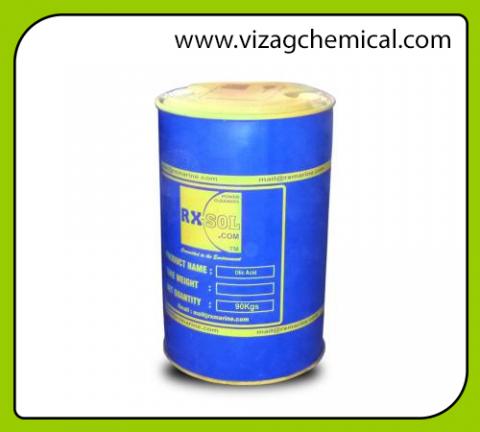Primary tabs

Oleic Acid 75% min
An unsaturated fatty acid that is the most widely distributed and abundant fatty acid in nature. It is used commercially in the preparation of oleates and lotions, and as a pharmaceutical solvent.
Oleic acid is used as an excipient in pharmaceuticals and as an emulsifying or solubilizing agent in aerosol products. It may hinder the progression of adrenoleukodystrophy, a fatal disease that affects the brain and adrenal glands, and it may help boost memory.
Oleic acid as its sodium salt is a major component of soap as an emulsifying agent. It is also used as emollient. Small amounts of oleic acid are used as an excipient in pharmaceuticals, oleic acid is used as an emulsifying or solubilizing agent in aerosol products. Small amounts of oleic acid are used as an excipient in pharmaceuticals. It is used as an emulsifying or solubilizing agent in aerosol products. Oleic acid have been shown to be important for the growth and productivity of Chinese Hamster cells. Functions of Oleic Acid in Cell Culture Systems: Long-term energy storage: energy derived from NADPH and ATP is stored in fatty acids. Fatty acids are esterified to a glycerol backbone to form a group of compounds known as mono-, di- and tri- glycerides (neutral fats). Energy is released when fatty acids are degraded. It is estimated that 40% of active substances are poorly soluble in water. The improvement of bio-availability of drugs with such properties presents one of the greatest challenges in drug formulations. This can be overcomed easily by using lipid based exciepients such as oleic acid to improve drug delivery system. Self emulsifying drug delivery system is one of the potential approaches for poorly soluble drugs which can be easily overcome by Oleic acid. Henceforth one can see a wide use of oleic acid as an excipient in drug delivery system.
Oleic acid is used as a component in many foods, in the form of its triglycerides. It is a component of the normal human diet, being a part of animal fats and vegetable oils.
Oleic acid as its sodium salt is a major component of soap as an emulsifying agent. It is also used as an emollient. Small amounts of oleic acid are used as an excipient in pharmaceuticals, and it is used as an emulsifying or solubilizing agent in aerosol products
Oleic acid is soluble in benzene, chloroform, ethanol, ether, hexane, fixed volatile oils and practically insoluble in water.
INCOMPATIBLE WITH:- Aluminum, Calcium, Heavy metals, Iodine solution, Perchloric acid and Oxidising agents
|
||||||||||||||||||||
On exposure to air it gradually absorbs oxygen and darkens in color and develops a more pronounced odour. It decomposes when heated at 80 to 100 °C.
An unsaturated fatty acid that is the most widely distributed and abundant fatty acid in nature. it is used commercially in the preparation of oleates and lotions, and as a pharmaceutical solvent. Major constit. of plant oils e.g. olive oil (ca. 80%), almond oil (ca. 80%) and many others, mainly as glyceride. Constit. of tall oil.
Also present in apple, melon, raspberry oil, tomato, banana, roasted peanuts, black tea, rice bran, cardamon, plum brandy, peated malt, dairy products and various animal fats. Component of citrus fruit coatings. Emulsifying agent in foods Oleic acid is a monounsaturated omega-9 fatty acid found in various animal and vegetable fats. The trans isomer of oleic acid is called elaidic acid.
